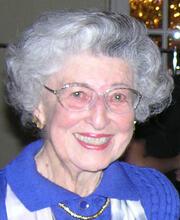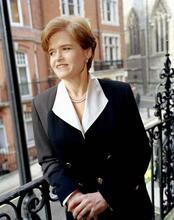Lillian Ruth Kessler
Lillian Ruth Kessler created a major export company for automobile parts and heavy industrial and military equipment, making her a pioneer in a business that had been exclusively male territory. After graduating college, Kessler taught history in Cleveland’s public schools before completing graduate studies at Western Reserve University. She served as director of the Historical Records Survey in Ohio and co-edited an anthology called Songs of Yesterday in 1941. Later, she was an archivist at the Library of Congress, studying discontinued projects of the Works Progress Administration. In 1947, she moved into the business world, creating Kessler International Corporation, for which she regularly travelled to countries like Pakistan, Iran, and South Korea to work with clients. The company remained successful even after Kessler’s retirement.
In 1982, when she retired from the presidency of Kessler International Corporation, Lillian Kessler prepared a brochure listing the principal export items of the company she had founded in 1946. The list included abrasives, adhesives, locomotive parts, chemicals, navigational and meteorological instruments, tank and jeep bearings, crankshaft and camshaft grinders, and many other automotive parts. A pioneer in a “man’s business,” Kessler established the first American export business that catered exclusively to buying missions attached to foreign embassies in Washington, D.C. For many years, she was the only female member of the Overseas Automotive Club, a national trade organization.
Early life: education and marriage
Lillian Ruth Kessler was born on March 15, 1908, in Cleveland, Ohio. She was the first of three children, followed by Beatrice and Edwin, born to Mary (Galen) and Julius Kessler. Julius, a manufacturer and wholesaler of men’s sport clothing, had emigrated from the Ukraine to New York at age fifteen to join his father and siblings. Mary Galen came to New York from Odessa with her parents at age four. Galen’s family moved to Philadelphia and then to Cleveland.
A brilliant child, Lillian Kessler excelled academically, developing interests in history and politics. She became president of Glenville High School’s competition-winning debate team and was, for a time, its only female member. At age sixteen, she entered the University of Michigan. She transferred to Radcliffe College the following year, but completed her college degree at Western Reserve in 1929. She then became a junior high school history teacher in the Cleveland public school system.
In 1930, she married Joseph Fuchs, the concertmaster of the Cleveland Orchestra. A daughter, Elinor Clare Fuchs, was born in 1933. As a young mother, Kessler returned to graduate school to study American history at Western Reserve, earning an M.A. and embarking on a Ph.D. Her mentor, Professor Robert C. Binkley, who was a consultant in the creation of the Works Projects Administration’s Historical Records Survey, recommended Kessler as a prototype developer for the Ohio State program. She accordingly left academic life for the workplace.
Historical work
Lillian Kessler and Joseph Fuchs separated in 1938, divorcing in 1940. In 1939, Kessler was appointed director of the Historical Records Survey for the state of Ohio. Around this time she also collaborated with Philip D. Jordan on an anthology of old American songs called Songs of Yesterday (1941).
In 1943 she moved to Washington, D.C., accepting a position as Library of Congress archivist of the now-discontinued white-collar projects of the WPA. She left that position after only a few months to work as a technical analyst, studying postwar reconstruction for the Foreign Economic Administration, a federal agency. After the war, she briefly worked as a foreign markets consultant to various companies, including Sinclair Oil. During this period, she wrote the article “The Industrialization of China” for the anthology Towards World Prosperity (1947).
Kessler International Corporation
In 1945, Lillian Kessler was well positioned to recognize a postwar opportunity. American automotive equipment covered the globe; the foreign governments that owned U.S.-built trucks, jeeps, and tanks would require spare parts to keep these vehicles serviced. By learning the secrets of “parts interchange” (for instance, that General Motors spark plugs might actually be made by another company), Kessler saw that she could supply foreign governments at prices below those offered by the automotive manufacturers. The business that she began in 1946, Kessler International Corporation, specialized in automotive parts, but eventually expanded to the sale of road- and dam-building equipment, electronic and communications components, and military support supplies.
To represent her business, Kessler traveled widely in the 1960s and 1970s, making solo trips to India, Pakistan, Iran, South Korea, and Japan. Health problems forced her to seek a buyer for the business in the late 1970s. Kessler International has continued, in greatly expanded form, under new leadership.
Family life and Jewish life
Kessler maintained an active family life with her daughter, her two grandchildren, Claire and Katherine Finkelstein, and the five children of her brother Edwin, a psychoanalyst, who established his practice in Washington, D.C., after the war. She became a collector of modern Latin American artwork, eventually donating twelve paintings by the Panamanian painter Dutary to the Art Museum of the Americas.
Kessler’s maternal grandfather broke with Orthodox Jewish tradition, identifying with the socialist thinking then sweeping Jewish circles. Her parents joined Abba Hillel Silver’s Reform Jewish temple in Cleveland, where Lillian was confirmed at age fourteen. Later in life, she maintained a nominal attachment to the Reform Washington Hebrew Congregation. However, her Jewish identification was largely cultural, and evinced itself in her racially progressive views and liberal politics.
After a long illness, Lillian Kessler died on September 18, 1993, in Washington, D.C.









